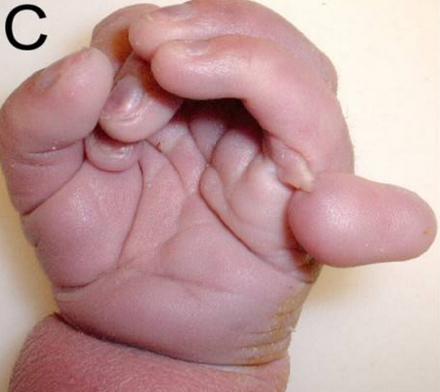Patau Syndrome
Patau syndrome, also known as trisomy 13, is a chromosomal disorder characterised by the presence of an extra copy of chromosome 13 in some or all cells of the body. This genetic anomaly disrupts normal development, leading to multiple and complex organ defects.

Causes
Patau syndrome results from trisomy 13, where each cell in the body has three copies of chromosome 13 instead of the usual two. This can happen due to nondisjunction during meiosis, leading to a full extra copy of chromosome 13 in each cell, or due to nondisjunction during mitosis, creating a mosaic form where only some cells have the extra chromosome. It can also occur when part of chromosome 13 translocates to another chromosome. Most cases arise from random events during the formation of reproductive cells, not inherited patterns. However, Patau syndrome due to a translocation can be inherited, increasing the risk of recurrence in subsequent pregnancies.
Signs and Symptoms
Common abnormalities in infants with Patau syndrome include intellectual and motor disabilities, microcephaly, and holoprosencephaly. Structural eye defects such as microphthalmia, cataract, and optic nerve hypoplasia are also prevalent. Physical anomalies like polydactyly, low-set ears, and cleft palate are often observed. Urogenital defects, heart abnormalities, and specific features like rocker-bottom feet and cutis aplasia are characteristic.



Diagnosis
Diagnosis is typically based on clinical findings and confirmed by foetal chromosome testing, which shows trisomy 13. Physical findings may overlap with other syndromes like Edwards syndrome, but features such as polydactyly are distinctive. The quad screen is not reliable for screening Patau syndrome due to result variability.
Treatment
Treatment is highly individualised and focuses on the specific physical problems of each child. Many infants face severe neurological issues or complex heart defects, making early survival challenging. Surgical interventions may be needed for heart defects or cleft conditions. Physical, occupational, and speech therapies can help children achieve their developmental potential. Although many children do not survive beyond the first year, those who do are often described as happy and enriching their parents' lives.
Prognosis
The prognosis for Patau syndrome is generally poor, with about 90% of affected infants dying within the first year. Survivors often have severe intellectual disabilities, seizures, and psychomotor issues. Individuals with mosaic Patau syndrome may have less severe manifestations. A Canadian study showed a median survival time of 12.5 days, with 19.8% surviving one year and 12.9% surviving ten years, including those who had aggressive surgical interventions.
History
Patau syndrome was first observed by Thomas Bartholin in 1657, but the chromosomal basis was identified by Dr. Klaus Patau and Dr. Eeva Therman in 1960. The syndrome is named in honour of Dr. Patau. In England and Wales during 2008-09, there were 172 diagnoses, with most being made prenatally and a significant number resulting in elective abortions. About 4% of unknown outcomes are likely to result in live births, estimating approximately 18 live births.
Self-assessment MCQs (single best answer)
What chromosomal abnormality characterises Patau syndrome?
Which of the following is NOT a common symptom of Patau syndrome?
What is the primary cause of Patau syndrome?
Which of the following diagnostic tests confirms the presence of trisomy 13?
What is the typical prognosis for infants diagnosed with Patau syndrome?
Which of the following physical anomalies is characteristic of Patau syndrome?
Who first identified the chromosomal basis of Patau syndrome?
Which organ system is frequently affected by severe defects in infants with Patau syndrome?
What type of therapy is often required for children with Patau syndrome to help them achieve developmental milestones?
How is the diagnosis of Patau syndrome usually made?
Dentaljuce
Dentaljuce provides Enhanced Continuing Professional Development (CPD) with GDC-approved Certificates for dental professionals worldwide.
Founded in 2009 by the award-winning Masters team from the School of Dentistry at the University of Birmingham, Dentaljuce has established itself as the leading platform for online CPD.
With over 100 high-quality online courses available for a single annual membership fee, Dentaljuce offers comprehensive e-learning designed for busy dental professionals.
The courses cover a complete range of topics, from clinical skills to patient communication, and are suitable for dentists, nurses, hygienists, therapists, students, and practice managers.
Dentaljuce features Dr. Aiden, a dentally trained AI-powered personal tutor available 24/7 to assist with queries and provide guidance through complex topics, enhancing the learning experience.
Check out our range of courses, or sign up now!


